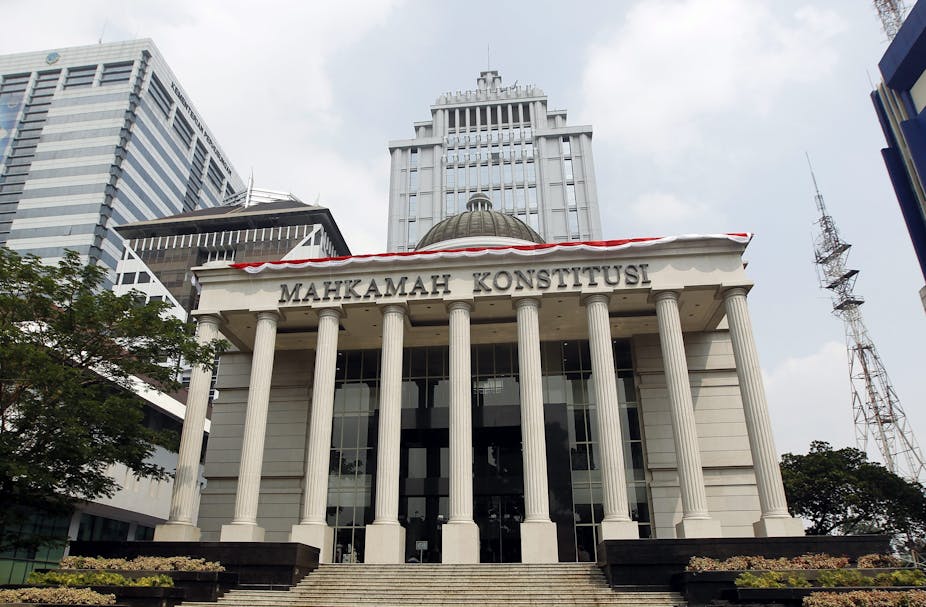As many analysts predicted, Indonesia’s Constitutional Court (MK) has rejected losing presidential candidate Prabowo Subianto’s challenge to the election result.
Despite the decision, which is final and binding, Prabowo has yet to concede defeat and congratulate Joko Widodo, who is better known as Jokowi, on winning.
Through the State Administrative Court, his legal team is still challenging the legality of the Jakarta governor Jokowi running for the presidency. Probowo’s coalition is also planning to set up a special committee in parliament to question the election process and result.
Whatever he does, though, the Constitutional Court ruling is clear. Prabowo lost.
The Constitutional Court process
The challenge from Prabowo and his running mate, Hatta Rajasa, was based on seven main issues:
Errors in vote counting by the Election Commission (KPU);
Fraud in voters list, election logistics and the commission’s digital security system;
Mobilisation of non-listed voters;
Two governors favoured Jokowi and running mate Jusuf Kalla;
KPU-engineered fraud allowing people to vote more than once;
Money politics in various areas that contributed to Jokowi’s victory;
The election commission destroying evidence by opening the ballot box.
The court rejected all those complaints. In other words, MK rejected the entire plea.
In MK’s legal consideration, Prabowo’s team did not support the charges with strong evidence. Its case was unclear and not detailed. Prabowo’s legal team failed to convince the panel of Justices that there have been structured, systematic and massive fraud.

Even if there were some violations in a number of voting stations that would require a re-vote, the court deemed that it would not change the ranking of the candidates based on the total votes. The margin between Jokowi and Prabowo is around 8.4 million votes.
However, the court made directions to improve the quality of future elections. Regarding additional voters and special voting procedures that the Election Commission created for people who had not registered to vote but wanted to vote on election day, the court ruled that these instruments were only transitional. They are to be used in a strict manner until the country’s civil administration system has improved.
The court also noted a need for the election monitoring body (Bawaslu) to be meticulous in recommendations to the Election Commission. The court said the monitoring body should improve its monitoring system to ensure the recommendations are carried out.
No appeals to overturn MK’s decision
In Indonesia’s legal system, the Constitutional Court is a special court separate from the Supreme Court (MA) but of the same level.
Its decisions are final and binding. The court’s ruling immediately takes effect once announced. There are no appeals against Constitutional Court decisions.
Nevertheless, Prabowo’s legal team is continuing challenges through the State Administrative Court and the Supreme Court. The two institutions are likely to reject these challenges.
Only the Constitutional Court has the authority to settle presidential election disputes. Even if the State Administrative Court or the Supreme Court granted a number of administrative complaints by Prabowo’s legal team, that would not change the Constitutional Court’s ruling.
In short, the Constitutional Court ruling effectively marks the end of Prabowo-Hatta’s legal challenge.
Persistent challenge for Jokowi
The Constitutional Court has become a blessing for Indonesia’s democracy. Its presence has created a forum that can effectively accommodate and examine complaints from candidates in presidential, legislative and regional elections.
Physical conflicts in election disputes that were often played out in the streets have shifted to healthy argumentation in the courtroom.
The presidential race this year was very tight. We could imagine the potential conflict between supporters if there were no court forum like the MK.
Jokowi-JK’s victory is now legitimate in the eyes of law. However, with Prabowo creating a special committee in the parliament to challenge the outcome, Jokowi will continue to face political resistance to his presidency.

